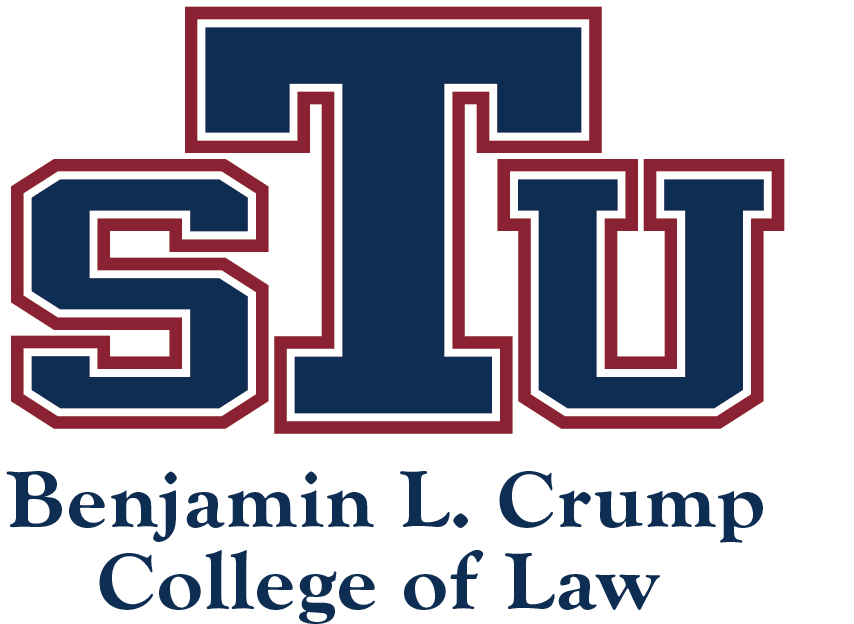Joint Degree Programs
The faculties of the College of Law and the graduate schools work in close collaboration to offer three exciting joint-degree programs: the J.D./M.S. in Sports Administration, the J.D./M.B.A. in Sports Administration, and the J.D./M.B.A. in International Business.
These programs offer St. Thomas students the opportunity to complete both the Juris Doctor and the Master’s degrees in the three years it typically takes to complete the Juris Doctor degree alone. The Graduate School and the College of Law have agreed to accept credits courses taken at the other school, thereby reducing the total number of credits needed for both degrees. Participants thus complete both degrees, receiving a diploma for each, in a reduced period with reduced overall costs.
Programs
For the law student interested in working as a college athletics compliance officer, sports agent, commissioner of sports leagues or conferences, or any number of other sports-related legal careers, the J.D./M.S. in Sports Administration is an excellent choice. Students receive a first-rate legal education through the College of Law, while taking specialized sports administration classes towards their Master’s degree at the University. Classes in sports administration provide students with the unique skills necessary for success in this area through courses in sports financial management, sports marketing and promotions, and sports media and public relations. Please contact Evelyn Calama-Sosa at ecalama-sosa@stu.edu or 305-628-6528 for more information on the Graduate Program in Sports Administration. Click here for more information.
Students in the joint J.D./M.B.A. program in International Business gain the skills necessary for success in today’s rapidly changing, global business environment through courses in international economic, international trade law, international business transactions, securities regulation, Cyberlaw, and European Union law. Miami, one of the world’s most active commercial hubs is the perfect venue for this program. Please contact Dr. Raul Carillo at 305-628-6534 or rcarillo@stu.edu for more information on the Graduate Program in International Business. Click here for more information.
Students will enjoy the litigation, negotiation, advisement, counseling, and drafting skills required of lawyers. Additionally, students will be able to bring to bear the interdisciplinary scholarship of sociology, criminology, psychology, and economics as these impact the law and criminal behavior. The course offers students the opportunity to undertake and critically assess original research findings as they resonate with respect to such contentious legal issues as abortion, immigrant rights, prosecutorial waivers of juveniles, decriminalization of soft drugs, and capital punishment. Further, as a natural consequence of attending the course, students will acquire the ability to articulate a unique set of competencies that complement black letter law with more theoretical and scientific teachings of the social sciences as these relate to law and justice. Please contact Dr. Gary Feinberg at 305-623-6578 or at gfeinbergi@stu.edu for more information on the Graduate Program in Criminal Justice.
Admissions
St. Thomas University College of Law offers five joint degrees in conjunction with St. Thomas University. These joint degrees offer St. Thomas students the opportunity to complete both the Juris Doctor and Master’s degrees in the three years it takes to complete the Juris Doctor alone. Applications for the joint degree programs will become available the second semester of your first year of law school, with graduate classes beginning the summer between your first and second year of law school. Please contact the Office of Graduate Admissions at 305-474-6709 or email Yasdanee Valdes at Yvaldes@stu.edu for information on graduate school admissions and the joint degree program requirements.
Tuition and Fees: Joint Degree Program
Tuition and fees costs for students matriculated in the Joint Degree Program will vary each semester based on the number of credits enrolled in each program.
Students interested in applying for federal student loans to assist with the financing of their education should follow the same application process as traditional law students, and will be eligible to receive aid up to the same Cost of Attendance as traditional law students. On a case-by-case basis a joint degree student’s financial aid award may be increased to cover tuition and fee charges exceeding the law school flat rate tuition costs. Please visit the Financial Aid webpage or contact our Financial Aid and Student Services Advisor, Andy Marrero at amarrero@stu.edu with any questions or concerns regarding funding your studies as a Joint Degree Student.
Grading
For College of Law and Graduate School courses, joint degree students will be graded on the respective grading scales applicable to them at the College of Law and Graduate School.
Academic Standing
Joint degree students who exceed the necessary requirements for good standing in the J.D. program at the College of Law and at the Graduate School in which they are enrolled shall remain in good academic standing. Those who fall below the minimum levels required for good standing at either school are placed on academic probation, subject to the rules governing academic probation and dismissal at the School or Schools at which they are on probation.
Except in exceptional circumstances in which a student is granted a leave of absence, students admitted into a joint degree program must take classes continuously upon admission into the program into completion of all required courses. Failure to satisfactorily complete all required courses in the graduate school will preclude the student from obtaining the graduate school degree and the J.D. Failure of the student to complete all required courses in the law school will likewise preclude the student from obtaining a J.D. degree or the respective graduate degree. The entire required graduate school curriculum serves to replace elective credit hours the law student would otherwise have to take to acquire the J.D. degree. However, individual graduate course credit hours are not transferable to the J.D. degree. Accordingly, students must complete all required graduate school courses in order to meet graduation criteria for the J.D. degree. Students are not given partial credit. In the event the student does not satisfactorily complete all required courses in the respective graduate school the student will then be required to take elective courses in the J.D. program sufficient to satisfy graduation requirements and the student will not be given J.D. credit for the graduate degree courses.
Likewise, in the event the student does not successfully complete the required J.D. program, the respective graduate school will not count any of the law school courses toward degree requirements in the respective graduate school and the student would have to acquire sufficient credit hours in the respective graduate school to qualify for the respective graduate school degree.
Cost
Upon admission to the joint degree program, students pay the applicable graduate tuition rate per credit for the courses taken in the respective graduate school and the applicable law school tuition rate per credit hour for courses taken in the law school . Students are responsible for all other fees and costs applicable to law and/ or graduate students.
Withdrawal from Program
Students may withdraw from the graduate school component of the joint degree program at any time. However, upon withdrawal none of the credit hours earned in the respective graduate school are credited toward the J.D. degree and the student must complete all J.D. requirements to receive his or her J.D. degree.
Students who withdraw from the law school component of the joint degree may continue with their graduate school degree. However, credits earned in the law school will not transfer to the respective graduate school. Students must meet the graduation requirements of the respective graduate school to qualify for the graduate degree.
Financial Aid
Participation in a joint degree program does not affect the student’s eligibility for scholarships or financial aid otherwise available from the law school. Student loans and other sources of funds may be available through government subsidized loan programs. Students must comply with the applicable rules and procedures for obtaining such loans.
Honors
Participants in the joint degree programs must meet the same criteria otherwise applicable to J.D. students to graduate with honors in the J.D. program and must meet the same criteria otherwise applicable to graduate with honors in the graduate degree program.
Administration
Students in the joint degree programs must follow all administrative procedures for registration as required by both the law school and the respective graduate school. The Assistant Dean for Student Affairs from the law school and the joint degree program coordinator of the respective graduate school shall serve as advisors to the Joint Degree students. In the event of a student requiring special consideration or deviation from the requirements contained herein, both the Director of Student Affairs of the law school and the joint degree program coordinator of the respective graduate school must unanimously agree to such modification or deviation.

